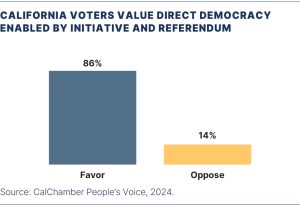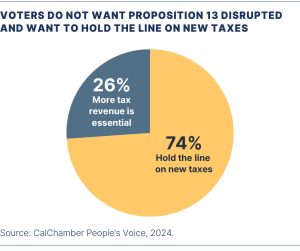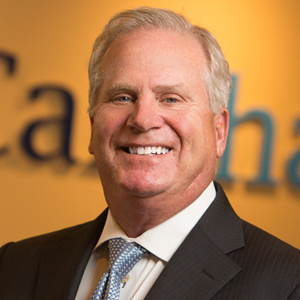The People’s Voice
Annual Poll Shows Voters’ Priorities for Legislature
Key takeaways for state policy makers are evident in the California Chamber of Commerce poll The People’s Voice 2024, the 10th in a series of annual surveys of California voters.
• Voters want more focus on growing jobs in the state, protecting our economy, and prioritizing spending on housing, law enforcement, homelessness, public education and economic development.
• Voters like direct democracy through the state’s initiative process but remain concerned about costs, including the cost of homeownership and energy policies.
• Voters remain steadfast in their opposition to new taxes and polices that would advance single-payer health care.
Growing Jobs
 More than 90% of voters agree that California needs to do more to attract and retain businesses in the state. By a 71% to 12% margin, voters say that “good paying jobs are hard (versus easy) to find,” and a plurality (45%) report that “major employers or businesses have left their community in recent years to relocate to another state (that is, outside California).”
More than 90% of voters agree that California needs to do more to attract and retain businesses in the state. By a 71% to 12% margin, voters say that “good paying jobs are hard (versus easy) to find,” and a plurality (45%) report that “major employers or businesses have left their community in recent years to relocate to another state (that is, outside California).”

Views on Sacramento Policies
Only 37% of voters agree that the policies from Sacramento have improved their lives, leaving an opportunity for the new Legislature to step in and change outcomes.
Voters were asked to judge the Legislature on how effectively they are spending on various priority programs. Trust was wide-ranging.
Opinions were about evenly split on the effectiveness of wildfire prevention and response and water supply and conservation, while public safety and addressing climate change received a 43% approval on effective spending. At the far end of the spectrum was the effectiveness of spending on homelessness, which received overall negative reviews from 85% of voters.
Spending Priorities
In assessing policy priorities in a possibly tight state budget context, voters were asked to select which programs should or should not be protected against cuts.
Top priorities for keeping in place (based on the percentage of those polled choosing them) were programs for housing, law enforcement and homelessness, with economic development and public schools in the next tier. On the other side, voters pointed to benefits for undocumented residents, prisons, courts and climate change programs as lowest priority for spending.
No New Taxes
The venerable citizens’ initiative that stabilized property taxes, Proposition 13 from 1978, continues its nearly five-decade run of popularity — viewed favorably by 85% of voters.
By a 3-to-1 margin, voters want to hold the line on new taxes rather than raise taxes for essential programs.

Housing

Voters also are highly skeptical of weakening Proposition 13. In 2020, Californians rejected a ballot measure that would have enacted a split roll property tax to raise billions in new taxes on property used by businesses and farmers. It’s possible that California voters will consider this measure once again in a future election.
The cost and availability of housing remains top of mind for Californians, whether homeowners or renters. Voters support several policies that could reduce costs or spur more housing construction:
• 89% support reducing the amount of fees on new housing levied by local governments.
• 79% support limiting litigation over housing projects that have already been approved by local officials.
• 74% support enacting laws such that if a housing project passes all the state’s strict building and environmental impact requirements, then local activists and local laws cannot block that project.
• 73% support using tax dollars to increase subsidies for low-income housing and local housing and shelters for homeless individuals and families.
• 69% support reforming regulations that add expensive and time-consuming roadblocks to building new housing units.
Climate Change
Voters generally support the state taking an active role in addressing climate change, but they are concerned by the cost and impact on their lifestyle. Californians have become much more sensitized to inflation and affordability, and embrace fuel and utility costs as an avatar of the overall cost of living. Nearly four out of five voters (79%) believe new policies to reduce carbon emissions are more likely to cause prices and costs in California to increase.
• 84% oppose intentionally designing roads or highways to be more congested to discourage driving.
• 78% oppose new fees for driving gasoline-powered vehicles.
• 71% oppose banning the sale of gasoline-powered vehicles by 2035.
• 68% oppose taxing vehicles based on how many miles they drive.
• 65% oppose phasing out the use of natural gas cooking in homes and restaurants.
• 64% oppose banning construction of new gas stations.
• 62% oppose phasing out the use of natural gas for home heating and water heating.
Artificial Intelligence
The Legislature dove into the artificial intelligence (AI) subject area in 2024, considering more than 50 bills, including some that would have deeply regulated the development of AI models and tools. Voters are clearly aware of this new technology, and since surveyed on it in 2023, have an increasingly positive attitude about AI.
Asked about the impact that AI will have on their lives over the next few years, 37% of voters indicated it would be positive, versus 29% saying it would be negative. This is a reversal from the previous year, when the same question was 27%–35%, positive/negative.
Voters similarly reversed their opinion on the effect of AI on their children’s lives over the next several decades, with 47% believing it will be positive, and 36% negative.
Health Care
Single-payer health care is an evergreen issue in the Legislature, no matter the partisan tilt in the federal government. With this in mind, 91% of voters report that they are satisfied with their health insurance (asked of those with insurance), and 49% report that they are “very satisfied.”
Among those with private health insurance, 81% respond that they would rather keep their private insurance, as opposed to switching to a government-run single-payer approach.
Direct Democracy
California voters value direct democracy enabled by initiative and referendum. By a hefty 6-to-1 (86%–14%) margin, voters favor the ballot measure process that allows California voters to directly create new laws or repeal existing laws.
Methodology
The CalChamber poll was conducted by Bold Decision and Pierrepont Consulting & Analytics with online interviews from November 6–9, 2024, with 1,014 online interviews of California 2024 general election voters. The margin of error for this study is +/- 3.1% at the 95% confidence level. This is the 10th year CalChamber has published The People’s Voice survey.
Unaddressed Concerns
What are the most important, but unaddressed, concerns of Californians? More than 85% of voters expressed that elected officials in Sacramento are not spending enough time on the following issues:
- Making California more affordable,
- Expanding the state’s fresh water supply,
- Reducing taxes,
- Addressing the economic recession,
- Reducing crime,
- Addressing homelessness, and
- Addressing high housing costs.
Left unattended, these issues certainly contribute to anxieties expressed by California voters.
Personal Safety
One of the biggest sources of public anxiety is personal safety. Asked about crime, 69% say it has increased, with more than half of them saying it’s gone up “a lot.” More than 4 out of 5 voters agree that street crime, shoplifting and car theft have become rampant throughout California, and 63% agree that they no longer feel safe because of danger and disorder in society today. That last sentiment has grown stronger over the base three years.
As to possible responses, half of voters support increasing funding and resources to law enforcement and another 38% say funding should remain about the same. Nearly 9 in 10 voters (61% strongly) believe that violent offenders should be kept in prison for their entire sentence, as determined at the trial. A similar 89% of voters (56% strongly) agree that prosecutors who refuse to enforce the law should be replaced.
Drought
Along with the economy, top-of-mind for voters is the drought. By a 4-to-1 margin, voters say the drought represents the new reality for California, as opposed to a short-term problem. And 87% of voters say that state leaders are not spending enough time working to expand the state’s fresh water supply.
When it comes to solutions and strategies, voters overwhelmingly support new infrastructure and technology to address water shortages. By a large margin, voters support (89%, 52% strongly) expedited permitting of desalination plants along the coast and expedited permitting of off-stream water storage reservoirs (89%, 41% strongly). Similar support was expressed for expedited permitting of recycling plants that make sewage effluent (treated, reclaimed wastewater) and stormwater drinkable.
Conservation and regulatory measures also are supported by voters. Voluntary water reductions by residential users and mandatory reductions for all other users was supported by 83% of voters, while mandatory water rationing for all users was supported by 64% of voters.
Climate Change
A perennially popular issue with elected California leaders is climate change and regulations to mitigate its causes. A plurality of California voters (43%) agree that California is not moving fast enough when it comes to policies addressing climate change (another 30% believe the state is moving at the right pace). But when it comes to both setting priorities and the policy details, voters diverge from their leaders.
Voters strongly support measures to address wildfire suppression and mitigation. Controlled burning to eliminate dry underbrush on public and private land is supported by 85% of voters, as is limiting future housing development in areas prone to wildfires (84%).
Cost Concerns
But voters shift gears when a policy implicates their lifestyles or pocketbooks. They oppose (52%) the ban on sales of gasoline-powered automobile engines by 2035, strongly oppose (61%) requiring any new highway expansion include only carpool or toll lanes, and overwhelmingly oppose (70%) increasing taxes on gasoline or diesel to discourage use of internal combustion engines.
Californians understand that fighting climate change as a state will be costly. More than two-thirds of voters believe that new policies to fight climate change will cause the price of things to increase, while only a quarter of voters say these policies would have no impact on prices.
When asked directly how much more they’d be willing to spend in higher prices and higher taxes each month to combat climate change, Californians voted with their pocketbooks. Half responded that they would pay no more, and another 30% responded no more than $50 per month.
Proposition 13/ Labor Litigation
A bedrock issue for California voters is Proposition 13 — namely, protecting it. After 44 years, Proposition 13 is just as popular as ever, with 85% of voters having a favorable view of the property tax reform (44% very favorable).
From a venerable ballot measure to a brand new one, voters continue their strong support to reform litigation over Labor Code violations, also known as “PAGA” (Private Attorneys General Act). A 2024 ballot measure would require Labor Code violations to be handled by independent state regulators, and 100% of penalties for violations be paid to employees — instead of the state. The measure also would allow employees to take their case to court if they are not satisfied with the regulator’s decision.
When asked about this proposal, 62% of voters indicated their support, with only 11% opposed. What’s more, this is a 13 percentage point increase in support since 2021.
Public Education
Schools are a high priority for voters, but that doesn’t mean they are satisfied with school performance.
After two years of the pandemic and its effect on public schools, including substantial learning loss among students and new state and federal funding, a strong majority of voters (57%) say the public education system in California needs major changes, another 36% support minor changes, and only 7% believe the system is basically fine.
Given a choice among various strategies to improve public education and recover from pandemic learning loss, voters selected as their top three: increasing the statewide budget for education and pay to recruit more teachers; substantially increasing the availability of tutors, especially for at-risk students in key subjects; and allowing parents to choose the local public school to attend that best meets their child’s needs.
Health Care
Although the Legislature defeated single-payer health care earlier in 2022, proponents have not given up. But they will have to overcome substantial voter skepticism.
Asked about their current health insurance, a strong majority of voters (54%) responded they were very satisfied, and another 38% were somewhat satisfied. Among those with private health insurance (nearly half the sample), more than 7 out of 10 voters would rather keep their current private health insurance, compared with just 29% that would rather switch to a government-run single-payer approach.
Methodology
The CalChamber poll was conducted by Bold Decision and Pierrepont Consulting and Analytics with 1,000 online interviews of California 2022 general election voters from November 12–14, 2022. The margin of error for this study is +/- 3.1% at the 95% confidence level and larger for subgroups. This is the eighth year CalChamber has published The People’s Voice survey.
January 2023
Agriculture and Resources
California Environmental Quality Act (CEQA)
Climate Change
Education
Energy
Environmental Regulation
Health Care
Housing and Land Use
Immigration Reform
International Trade
Labor and Employment
Legal Reform
Managing Employees
Privacy
Product Regulation
Taxation/Budget
Tourism
Transportation
Unemployment Insurance/Insurance
Water
Workers’ Compensation
Workplace Safety
Recent News
Business Issues Guide
Policy Contact
 Martin R. Wilson
Martin R. Wilson
Executive Vice President, Public Affairs

